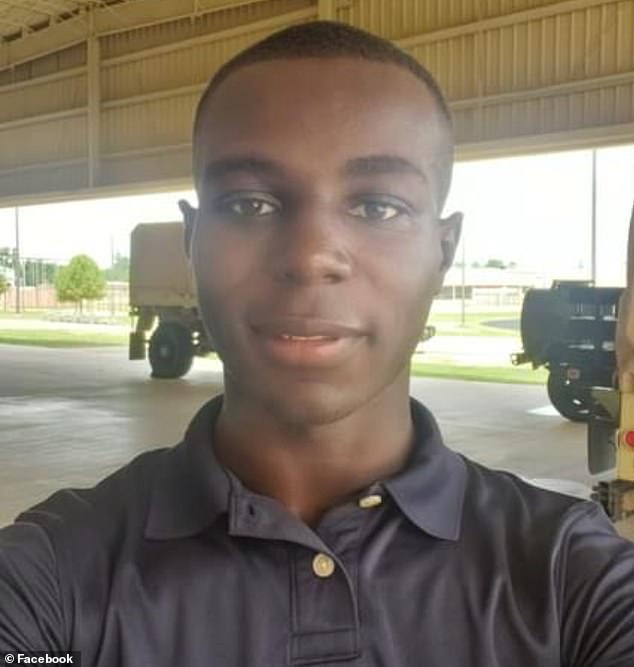Travis King, who crossed into North Korea before returning to US, charged with desertion and possession of child porn
The Army soldier who fled to North Korea before returning to the United States last month has been charged with desertion and child pornography.
Private Travis King, 23, was detained by the US military and faces charges including desertion and possession of sexual images of a child.
The charges have not been publicly announced, but officials confirmed eight charges against King.
King’s mother, Claudine Gates, said she is “extremely” concerned about the mental health of her son, whom she loves “unconditionally.” “As a mother, I ask that my son may have the presumption of innocence,” she said.
“The man I raised, the man I dropped off at boot camp, the man who spent the holidays with me before I was deployed, didn’t drink,” she told CBS News. “A mother knows her son, and I believe something happened to mine while he was deployed.”

Private Travis King, 23, was detained by the US military and faces charges including desertion and possession of sexual images of a child.

U.S. Army Private 2nd Class Travis King, circled, is pictured on a tour just before crossing the border into North Korea

King was flown to a U.S. military base in South Korea before returning home. He is also accused of kicking and punching other officers last year, unlawful possession of alcohol, making a false statement and possessing a video of a child engaging in sexual activity.
Desertion is a serious charge that can result in a prison sentence of three years.
King is also accused of kicking and punching other officers last year, unlawful possession of alcohol, making a false statement and possessing a video of a child engaging in sexual activity, according to the AP.
That accusation dates back to July 10, the same day he was released from a South Korean prison where he had spent almost two months for assault.
A week later, King ran from South Korea across the heavily fortified border, becoming the first American detained in North Korea in nearly five years.
He was scheduled to be sent to Fort Bliss, Texas, where he could have faced possible additional disciplinary action and discharge.
Officials said King was taken to the airport and escorted through customs. But instead of boarding the plane, he took off and later took part in a civilian tour of the Korean border village of Panmunjom.
He ran across the border in the afternoon, which is lined with guards and often packed with tourists.
After about two months, Pyongyang abruptly announced it would deport him. He was flown to an Air Force base in Texas on September 28.


King appears calm, wearing casual clothes and is photographed arriving in America after being expelled from North Korea
His release from North Korea was aided by Swedish officials who took King to the Chinese border, where he was met by U.S. Ambassador to China Nicholas Burns, Sweden’s ambassador to China and at least one U.S. Defense Department official. He was then flown to a US military base in South Korea before heading to the US
Once back in the U.S., King was taken to Brooke Army Medical Center at Fort Sam Houston, outside San Antonio.
He went through what the military describes as a “reintegration process” that included medical examinations, psychological assessments and debriefings. And he also got to meet family.
Because he voluntarily fell into enemy hands, he was legally held in military custody throughout that process.
At the time, officials said they did not know exactly why North Korea decided to let King go, but they suspected that Pyongyang determined that as a low-ranking soldier he had no real value in terms of influence or information.
King joined the Army in January 2021 and served as a cavalry scout. While he was away, the army leaders declared him absent without leave and chose not to consider him a deserter, which is much more serious.
By declaring King a deserter, the military would have to conclude that King left and intended to stay away permanently. In times of war, desertion can be punishable by death.
Service members may be absent for several days but may return voluntarily.
The punishment can include confinement in prison, forfeiture of wages, or dishonorable discharge and is largely based on how long they were away and whether they were apprehended or returned on their own.
The charging document does not provide significant details about the allegations, although it accuses King of knowingly possessing a video of a child engaging in sexual conduct on July 10 and says he is a user of Snapchat, a social media platform asked to make images of sexual activities of minors.
Sean Timmons, an attorney who specializes in military law at the Tully Rinckey law firm and who reviewed the charging document, said any transactions that took place on Snapchat were not secure or private and were accessible to the government.
“He probably reasonably believed that his illegal behavior would not have any evidence, but Snapchat basically stores everything,” Timmons told the AP.
